- Home
- Craig Lancaster
The Fallow Season of Hugo Hunter
The Fallow Season of Hugo Hunter Read online
PRAISE FOR CRAIG LANCASTER
Edward Adrift (2013)
“Edward Stanton is one of the more distinct and interesting characters you’ll encounter in contemporary fiction, and it’s never dull accompanying him. Edward Adrift, like 600 Hours before it, is such a well-written, big-hearted book that its pages fly by and will leave its readers no doubt hoping for a trilogy.”
—Billings (Mont.) Gazette
“It’s hard to know who I adore more: Craig Lancaster’s character Edward Stanton or Lancaster himself for creating him.”
—Jessica Park, bestselling author of Flat-Out Love and Left Drowning
600 Hours of Edward (2012)
Montana Honor Book and High Plains Book Award winner
“It’s a spare, elegantly crafted whizz-bang of a book that, on its surface, is as quiet and orderly as Edward Stanton, but underneath, also like Edward, a cauldron of barely repressed rage and desire seeking escape.”
—Missoula Independent
“This is a wonderful book. Mr. Lancaster’s journey . . . into the imaginative pages of fiction was one well taken, for himself, for readers and certainly for the lovingly created Edward Stanton.”
—Montana Quarterly
Quantum Physics and the Art of Departure (2011)
Independent Publisher Book Award gold medalist;
High Plains Book Award finalist
“Have you ever felt in your pocket and found a twenty you didn’t know you had; how ’bout a hundred dollar bill, or a Montecristo cigar or a 24-karat diamond? That’s what reading Craig Lancaster’s Quantum Physics and the Art of Departure is like—close and discovered treasures.”
—Craig Johnson, author of the Walt Longmire novels
“It’s a real delight to inhabit Lancaster’s lonely, darkly majestic Montana locations and desperate characters.”
—Chicago Center for Literature and Photography
The Summer Son (2011)
Utah Book Award finalist
“A classic western tale of rough lives and gruff, dangerous men, of innocence betrayed and long, stumbling journeys to love.”
—Booklist
Also by Craig Lancaster
The Summer Son
Quantum Physics and the Art of Departure
600 Hours of Edward
Edward Adrift
This is a work of fiction. Names, characters, organizations, places, events, and incidents are either products of the author’s imagination or are used fictitiously.
Text copyright © 2014 Craig Lancaster
All rights reserved.
No part of this book may be reproduced, or stored in a retrieval system, or transmitted in any form or by any means, electronic, mechanical, photocopying, recording, or otherwise, without express written permission of the publisher.
Published by Lake Union Publishing, Seattle
www.apub.com
Amazon, the Amazon logo, and Lake Union Publishing are trademarks of Amazon.com, Inc., or its affiliates.
ISBN-13: 9781477825440
ISBN-10: 1477825444
Cover design by Jason Ramirez
Library of Congress Control Number: 2014938754
For my stepfather, Charles Clines, who gave me the great gift of boxing when I was a scared nine-year-old. It settled my fears and focused my aspirations—namely, that I didn’t want a second season of it. You’ve been a role model and an uncommonly good friend.
CONTENTS
1
2
3
4
5
6
7
8
9
10
11
12
13
14
15
Excerpt from the introduction of Hugo Hunter: My Good Life and Bad Times
16
17
18
Excerpt from Hugo Hunter: My Good Life and Bad Times
19
Excerpt from Hugo Hunter: My Good Life and Bad Times
20
21
22
Excerpt from Hugo Hunter: My Good Life and Bad Times
23
Excerpt from Hugo Hunter: My Good Life and Bad Times
24
25
26
27
Excerpt from Hugo Hunter: My Good Life and Bad Times
28
29
30
Excerpt from Hugo Hunter: My Good Life and Bad Times
31
32
33
From page two of the Billings Herald-Gleaner Local section
34
Excerpt from Hugo Hunter: My Good Life and Bad Times
35
36
37
Excerpt from Hugo Hunter: My Good Life and Bad Times
38
Excerpt from Hugo Hunter: My Good Life and Bad Times
39
40
Excerpt from Hugo Hunter: My Good Life and Bad Times
41
42
Excerpt from Hugo Hunter: My Good Life and Bad Times
43
44
45
Excerpt from Hugo Hunter: My Good Life and Bad Times
46
47
48
49
Excerpt from the final chapter of Hugo Hunter: My Good Life and Bad Times
50
ACKNOWLEDGMENTS
ABOUT THE AUTHOR
1
The last time I saw Hugo Hunter in the boxing ring was on a miserable Tuesday that pissed down freezing rain in Billings, Montana. I stood in the shadows of the Babcock Theatre, past its prime just like Hugo, the stale stench of a century’s cigarettes climbing down from the rafters. I stood just out of the reach of the houselights but not nearly far enough away from what I was seeing—Hugo, on his hands and knees, a gloved hand pawing blindly for a mouthpiece that sat four feet behind him, drops of blood from his ripped brow dotting the canvas.
The kid who’d knocked him out, Cody Schronert, had already left the ring, he and his buddies making a jubilant procession of it. Biggest night of that guy’s life, beating Hugo Hunter. It was something he’d tell his kids about if any woman made the mistake of letting him father some. Schronert was a punk clear back to the days I covered him as a running back for Billings Senior High School. He’d crow about this, his newfound currency as the triumphant conqueror of the great Hugo Hunter. That would be his right, I suppose, but it would be a right asserted in opposition to a moral truth. The man he left crumpled under the Babcock lights bore about as much resemblance to the Hugo Hunter I once knew as Schronert, the blond-haired frat-boy son of Billings’s most vicious personal-injury attorney, bore to Mike Tyson.
Hugo at last gathered in the mouthpiece, and the crab hand formed by the leather glove slipped it into place, as if he had work yet to do. He pressed the gloves against the mat and pushed himself up, his chest rising, a fleshy roll tumbling over the belt line of his red satin trunks. A tucked right leg gave him a measure of stability, and he clambered to his feet, unsteady as a newborn colt.
The place had gone dead silent, largely emptied out. I’d watched as the people walked by, limp arms carrying spent bags of cartoon-yellow popcorn. They didn’t exhibit the cackling electricity I’d seen in most fight crowds, that pent-up aggression turned loose by overstimulation. This was sorrow on parade. They knew what they’d seen, and most of them looked as though they hadn’t contemplated what it all meant until just now. A scant few paying customers lingered, and most of t
hem had the good manners to turn away as Hugo crept through the ropes and down the ringside stairs.
Not me. I stepped a few feet closer. I always watched, even when I didn’t want to. It’s what I did, my role on this temporal stage. I was the fly on the wall, the little birdie, the man who knows, the guy in the scene but not of it.
It made me sick sometimes.
2
I’d come to the Babcock that night hoping I wouldn’t see what I saw, and knowing that hope doesn’t stand a chance against the unraveling of an old fighter. Hugo, out of the game for three years and a certifiable failure at every working-stiff job he’d tried in that time, had launched his hometown comeback a few months prior amid about as much hoopla as you’re going to see in a rag like the Billings Herald-Gleaner. He and one of his old trainers, Trevor “Squeaky” Feeney, held a press conference at the Crowne Plaza to announce a winter series of Tuesday night fights, a little sanctioned violence to soothe the weather-weary souls of Billings. At the newspaper, we gave it the big treatment: centerpiece on the front page, big photos, a timeline of Hugo’s rust-caked ring career.
Squeaky tossed it off as something local and fun, and Hugo went to great lengths to say the fights would be more like exhibitions for him, one more chance for everybody to see this town’s biggest star. And sure enough, every two weeks he’d be at the Babcock, taking on some local boy who thought the haymakers that cracked jaws in the parking lot of the Wild West Saloon might somehow work in the ring. Hugo liked to talk it up as if he were doing a civic favor, lending his fame to a small-time operation meant to entertain the restless locals, but it was plain to see that he was grabbing those $300 checks a little too eagerly and coming back for more a little too often.
I went to the first few fights, which was my duty, I suppose. God knows I’d long since made a name off being the guy who knew everything about Hugo Hunter. It hadn’t gotten me anything other than perhaps a cushy gig in the newsroom and a few appearances on ESPN back when Hugo’s fame was still untarnished, but it was more than I’d have had otherwise. Where Hugo went, I went. Barcelona. Las Vegas. London. And, much later, the Babcock Theatre, a two-block walk from the newspaper office downtown.
Hugo, at thirty-seven years old and far outside his prime, won those early matches, as he well should have, but something wasn’t right. The damage he incurred was glancing but obvious. You could see that Hugo wasn’t training. He was soft around the middle, dimpled with cellulite. A straight punch, which Hugo could surely throw, was enough to finish off the brawlers who were climbing in against him, but he was taking punishment he’d never absorbed before. Black eyes, a lumpy forehead, split lips, headaches that would level him, reducing him to talking to me through the front door of his house. “Not feeling so hot,” he’d say, the pent-up mustiness of his grandmother’s home slipping out and bumping into me. “We’ll talk tomorrow, OK? Keep your chin tucked, buddy.” Back when times were good, the ESPN guys called Hugo “the Minister of Defense.” You wouldn’t have believed that was possible if you saw what I saw those nights at the Babcock.
I knew what was coming, and I told Trimear, my boss at the Herald-Gleaner, that I’d just as soon move over to high school basketball and that Olden could take the Hunter beat, that it’d probably be good for the kid to cover a true star, or at least as close to one as we had in Billings.
Sometimes I wonder if I chickened out, bailing on Hugo because I could see the bad ending coming. I wasn’t brave enough to stand in there and take it, the way Hugo did, and that bothered me. The truth is, I did something you’re not supposed to do in the newspaper game. I got too close. Somewhere in between watching Hugo captivate the world as a seventeen-year-old and seeing him laid out on the canvas twenty years later, I came to care about him as the boy and man he was, not merely as a subject of the stories I wrote. I crossed a line and gave him my heart. That kind of proximity provides insight and access, but it’s dangerous. You become part of the picture, and then you’re in a position to change the trajectory of the story you’re trying to tell. Then, I couldn’t let that happen. Later, I realized that trying to change the story was the only thing that made sense.
Two weeks before that last fight, Olden came scurrying into the office, his cheeks red, his eyes alight. I knew the look. That’s a guy with a big story on his hook.
“He lost.”
Trimear stopped assaulting the keyboard with his meaty hands and walked over. “For real? To who?”
Olden grinned and swept a hand across his face, as if he could wring out the callowness. “Second-round TKO. Couldn’t defend himself. The guy, man, he was just all over him. Ref had to dive in there and save him.”
“What guy?” Trimear torqued his neck. Rising irritation. Olden, a fresh graduate and new to us, wouldn’t know that Trimear wanted everything right now, no suspense. He’d learn, though. Same as we all did.
Olden looked at his notes, and Trimear’s tic went into overdrive. “Seth Prosinski.”
“Who the hell is that?” Trimear asked.
“Just some dude. Came over from Watford City. Bakken roughneck. A nobody.”
Trimear moved in, almost on top of Olden’s desk now. “Was Larry there? Do we have art?”
“Oh, yeah,” Olden said. “He said he got a great picture of the ref hugging Hugo, holding him up. He’s tearing up. Maybe sweat. I don’t know. Larry says it’s great.”
Trimear practically did cartwheels across the newsroom. “McDonough,” he barked to the layout man, “pull up that weak-ass centerpiece. We’ve got something better.”
I slipped down into my chair, trying to see the words of a half-written high school game story that would probably be relegated to an inside page somewhere. I couldn’t find my way back in.
Olden came over. “Mark?”
“Yeah?”
He leaned in, talking low so Hop Raymont couldn’t hear him. “I don’t know how to write this, Mark.”
I tried a smile that about half worked, for Olden and for me. He shuffled his feet, and I bit down on the urge to commandeer his beat again. I could write the story, sure as anything. But it wasn’t my gig anymore. “Sure you do, kid,” I said. “They taught you how to write a lede at U of M, didn’t they?”
“Yeah.” He balled up a fist and flushed a shade of anger, a show of the spunk I liked so much the first time he set foot in the office.
“It’s nerves, is all,” I said. “Start with how it ended and work your way through it.”
Olden frowned. “Yeah. I guess.” He started to turn to his desk, and so help me, I had to ask.
“Bobby? Did Hugo go down?”
Olden shook his head. “Technical knockout. He wasn’t fighting back, but he didn’t drop.”
“What’d he say?”
The kid pulled his notebook to his face, and I stifled a laugh. When you’re a rookie, you’re so busy making sure you write down the answers that you never actually hear them. He ran his index finger under the lines as he read them in staccato.
“He said, ‘It was a fluke. All credit to that kid, but he got lucky. I’ll get ’em next time.’ ”
“Trevor going to let him fight again?”
“I think so. Didn’t seem real happy, though.” Olden’s tone kind of rocketed up there at the end. He must have seen my surprise—or my anger. “I mean, I asked. He didn’t say anything except that we’d do it again in a couple of weeks.”
“Goddamnit.”
“What?”
“Never mind, kid. Deadline’s ten thirty. You better get to work.”
That pretty much clinched it. Hugo’s descent into cliché and Squeaky Feeney’s neglect made it a sure bet that Hugo would return to the Babcock in a fortnight. Between editions, Trimear and I shivered under the Herald-Gleaner awning and worked through a couple of Camels each. I told him I’d like to take a day off.
“You gonna take that ki
d’s beat back from him now that your boy’s a loser?” Trimear choked out a nicotine laugh, and I set my hand against my lower back and leaned into the sandstone so I didn’t punch his fat face.
“Naw, I’m gonna take a night I usually have to work and go to the fights like a regular paying customer. Maybe have me a steak at Jake’s beforehand. Do it up right.”
A chuckle rasped out of him. “He’s done, you know.”
“No shit, Gene. Why do you think I’m asking for this time?”
“Big night. We got West-Senior. First place on the line. Not sure I can spare you.”
“You ever think about maybe trying to cover a game?”
“I gotta work the desk.”
I ditched my cigarette and smothered my other hand behind me. Trimear had a way of challenging my pacifist tendencies.
“You know, Raymont’s been your assistant for sixteen years,” I said. “You might try letting him run the show a night or two. He might surprise you. Or send him to the game.”
Trimear mashed out his cigarette on the building. “You’re a funny guy. Take the night, then. But when I have you working back-to-backs come tournament time, I don’t want to hear any bitching.”
I held my arms out, palms to the sky, a martyr to my cause of taking an irregular day off. “Well, jeez, Gene, you know me. As long as the queen doesn’t need me, I’m at your disposal.”
That sandpaper laugh again and then Trimear swiped his key card to head inside. A second or two later, he stepped back out.
“Forget your charm?” I asked.
Trimear didn’t laugh. He just looked at me, through me, to the street.
“I was just thinking,” he said. “You did the Hugo Hunter beat for a long time. Twenty years, right?”
“Yeah. So?”
“Nothing. I was just thinking.”
I stared back at him. There was nothing to say to that. Trimear’s way was inscrutability or jackhammer obviousness. He didn’t dabble in the in-between.

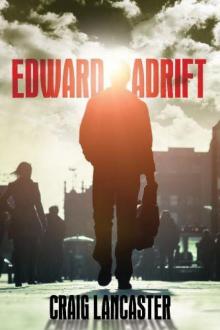 Edward Adrift
Edward Adrift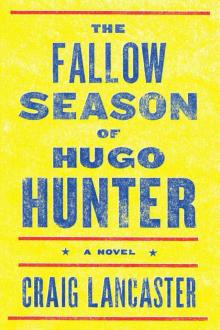 The Fallow Season of Hugo Hunter
The Fallow Season of Hugo Hunter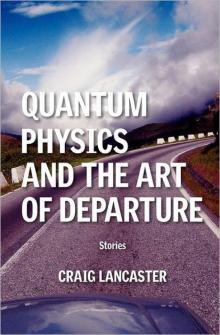 Quantum Physics and the Art of Departure: Short Shories
Quantum Physics and the Art of Departure: Short Shories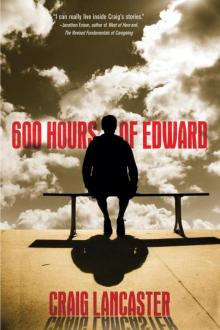 600 Hours of Edward e-1
600 Hours of Edward e-1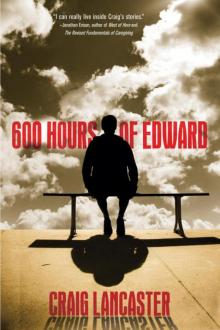 600 Hours of Edward
600 Hours of Edward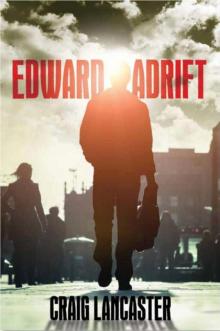 Edward Adrift e-2
Edward Adrift e-2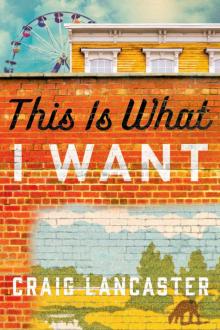 This Is What I Want
This Is What I Want